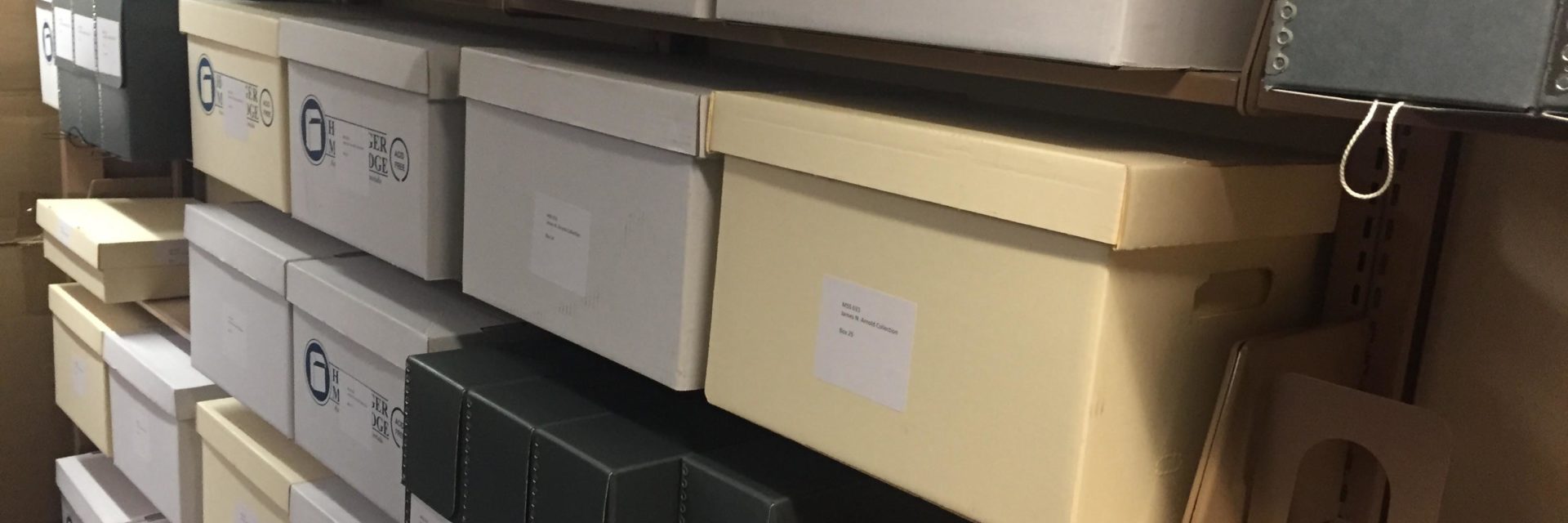Rhode Islander’s large historic and genealogical collection acquired last year has been fully processed
Providence Public Library (PPL) is pleased to announce that The James N. Arnold Collection, acquired last year from the Knight Memorial Library of the Providence Community Libraries (PCL), has been fully processed and is now open to researchers. “We are very excited to officially make this valuable historic collection available to area researchers as part of our Rhode Island Collection,” said Jack Martin, PPL Executive Director.
PPL formally acquired The James N. Arnold Collection in November 2015 and archivists have been working to process it over this past year. The collection is now part of the Rhode Island Collection at PPL, where it complements existing special collections materials on the history of the state. The Arnold collection totals 25 linear feet and two card catalog indexes. In addition, a full finding aid and inventory of the collection is available online at: http://www.provlib.org/wp-content/uploads/finding-aids/029-02-FA.pdf
“The Arnold Collection is an outstanding compilation of Rhode Island genealogical material. Many researchers have been eagerly waiting to access these materials. We know they will be of great use to the growing number of local genealogists in Rhode Island,” said PPL Rhode Island Collection librarian Kate Wells, who has overseen the collection’s processing.
Learn more about how to access the collection.
The collection consists of material compiled and written by James N. Arnold between 1860 and 1927 and of typescripts by volunteers continuing his work until 1935. It contains numerous research topics and writings related to the history of Rhode Island. It also includes personal records of James N. Arnold, such as Arnold family genealogy records and correspondence, Arnold’s personal writings, weather journals and photographs.

Business records include material related to printing and sales of Arnold’s publications. Research materials include transcriptions of cemetery records, vital records, and probates from Rhode Island towns and cities, topics related to the history of Rhode Island during the colonial period, Revolutionary War and Civil War. Specific topics include the Narragansett Indians, numerous family genealogies and histories, town histories, deeds and probate records, military records, numerous essays on various subjects.

The collection also includes cemetery and vital records from parts of Vermont, New Hampshire, Massachusetts, Connecticut and New York.

James N. Arnold (1844-1927) was a native of Cranston, Rhode Island. Arnold’s interest in local history and genealogy began early despite his lack of formal education. A descendant of Thomas Arnold, who joined Roger Williams in 1636 in Providence Plantations, Arnold spent his adult life working to provide accurate records related to Rhode Island history. In addition to transcribing local church records, pension rolls, burial records and town papers, he recorded and published two important works: The Narragansett Historical Register, an 8 volume set on the history of southern Rhode Island and the Vital Records of Rhode Island, the first comprehensive set of vital records for the state covering 1636-1850 in 21 volumes.
According to his bequest, upon his death in 1927 Arnold’s collection of historical research, publications, personal papers and personal library was given to the Knight Memorial Library on Elmwood Avenue in Providence.
The Rhode Island Collection at PPL
The materials in the Rhode Island Collection are by, for and about Rhode Island and its people. The collection consists of more than 20,000 books and pamphlets, an image collection containing more than 12,000 photographs of people, places and buildings, historic and current maps pertaining to Rhode Island cities and towns, newspapers, vertical files, postcards, and reference works. In addition, the collection is a full depository for state documents.
